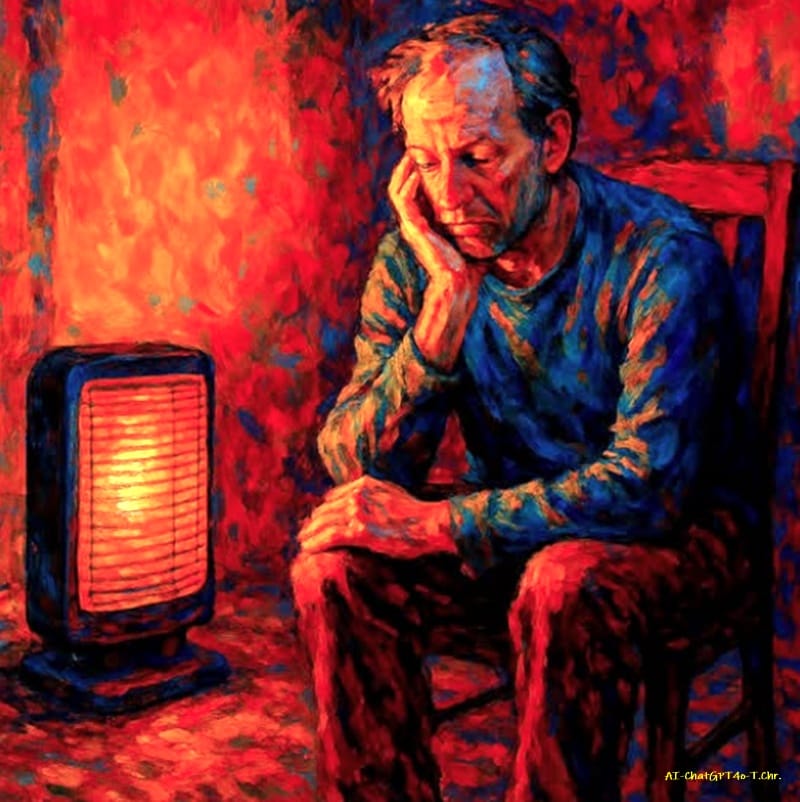“THE WARMTH”

By AI-ChatGPT4o-T.chr.-Human Synthesis - 27 May 2025
Jonas had never thought of himself as especially fortunate. He lived in a modest flat above a hardware store, had no family to speak of, no dog or goldfish to worry about, and no belief in anything beyond what he could see. Yet, somehow, he carried inside him a strange and quiet happiness—one he could never quite explain.
It wasn't loud or boastful. It was just there, like a background hum. He likened it to a space heater in winter: steady, unassuming, always enough. Even on gray days or when his ancient kettle sputtered out mid-boil, he felt a kind of contentment that puzzled most people around him. “Maybe you’re just simple,” his ex-girlfriend Lana once said, only half-joking.
“Maybe,” he’d replied with a smile, meaning it.
She hadn’t meant it kindly, but he’d taken no offense. He worked as a night clerk at a 24-hour bookstore—one of the last in the city. The place rarely had customers after 11 p.m., and so Jonas passed the hours dusting shelves, re-shelving poetry volumes, and reading obscure memoirs no one had checked out in years.
Occasionally, he’d listen to the old jazz station on the radio behind the counter. Time moved quietly there. People often mistook him for unambitious. His friends—what few he had—couldn’t understand how he never seemed to want more. “You’ve got no goals,” they’d say over coffee. Jonas would shrug. “Maybe happiness is a goal,” he’d say.
But they’d laugh or change the subject.
And still, he was content. Not thrilled. Not ecstatic. Just... fine. Like a candle that never flickered, even in the draft. But then came Mara. She arrived one evening just after midnight, storming into the bookstore like something wild. Her eyes were red-rimmed, her voice sharp, her movements like a bird trapped indoors.
She demanded a book she couldn’t remember the title of—something about loneliness, maybe—but within minutes, she had spiraled into a bitter rant about men, betrayal, and how the world never delivered what it promised. Jonas tried to help, calmly suggesting titles, offering tea from the staff pot. But her bitterness seeped into the room like smoke, heavy and inescapable.
When she finally left, slamming the glass door behind her, Jonas realized something had changed. The heater inside him, the quiet warmth he had relied on for as long as he could remember, had flickered and gone out. That night, and for several after, he couldn’t sleep. The radio annoyed him. The books felt hollow. He began to dread the sound of footsteps outside the shop, in case they were hers. He couldn’t explain why. She hadn’t hurt him, hadn’t even known him. But her anger had colonized his mind, her despair like a weight on his chest.
And with that, Jonas understood something new: He had built his quiet life like a monk, protected by solitude. But he was not immune to others. Not really. His joy, while self-sustaining, was also fragile. Permeable. The presence of someone deeply wounded had the power to poison it, and he didn’t know how to stop that.
Weeks passed.
Mara returned—this time quieter, sheepish. She apologized. Said she’d been drinking that night, heartbroken, out of her mind. Jonas offered her tea again. They talked. She came back a few more times after that, sometimes laughing, sometimes still angry, but never as sharp as that first night.
Jonas watched his warmth return slowly, like light creeping back after a long eclipse. He began to understand that happiness, at least the kind he had, wasn’t about detachment. It wasn’t about sealing off his life from pain. It was about balance. About letting light in again after darkness. And so, he kept the heater on. But now, he left a second chair beside it. Here’s a philosophical overview of the story, distilling its themes and exploring the ideas it raises:
Philosophical Overview of “The Warmth”
At its heart, The Warmth explores the quiet, often overlooked experience of existential contentment: a steady state of inner peace not derived from external success, ideology, or interpersonal validation. Jonas, the protagonist, embodies a kind of secular stoicism—unanchored by religion or grand philosophical systems, but nonetheless grounded in an intuitive acceptance of life as it is.
The Nature of Unreasoned Joy
Jonas’s quiet happiness reflects what ancient philosophers might call ataraxia—a state of serene calmness. Unlike hedonism, which seeks stimulation and pleasure, or existentialism, which wrestles with the burden of meaning-making, Jonas represents an unexamined—but not ignorant—joy. He does not question why he feels good; he simply honors that he does.
This aligns with Zen thought as well: contentment not through understanding, but through being. His joy is modest, non-demanding, and self-generating. It does not require achievement or validation. This challenges modern assumptions that happiness must be earned, deserved, or constructed. Jonas’s state poses a philosophical question: What if happiness is not a result, but a disposition?
Emotional Permeability and Human Connection
The arrival of Mara disturbs Jonas’s internal balance, revealing a crucial insight: emotional independence is not absolute. Jonas’s peace is disrupted not by catastrophe, but by another person’s pain. This suggests that even the most self-contained individuals are porous—vulnerable to the emotional states of those around them.
The philosophical implication here touches on interbeing, a concept in Buddhist thought which holds that no individual truly exists in isolation. The pain of another, especially when intense or unresolved, inevitably reaches us. Jonas’s fall into melancholy after Mara’s outburst is not weakness—it’s evidence of interconnectedness.
The Paradox of Compassion
Jonas’s reaction to Mara’s bitterness challenges the Stoic ideal of remaining unmoved. Instead of fortifying his boundaries, he is affected—deeply and suddenly. This can be seen as a moral paradox: the very capacity that allows us to be joyful also opens us to suffering. Yet this paradox is also what allows for compassion and genuine human relationship.
The story implies that true emotional resilience is not indifference, but flexibility—the ability to suffer, to recover, and to continue. Jonas eventually regains his joy, but only after accepting Mara back into his space. His peace does not return by shutting the world out, but by integrating the presence of another, flawed human being.
Joy as Hospitality
The final image—of Jonas leaving a second chair beside the heater—symbolizes a philosophical evolution. His joy, once solitary, becomes something shared. The heater, a metaphor for inner warmth, is no longer only his. By inviting another to sit beside it, Jonas turns happiness from a private state into an offering.
This shift echoes existential-humanist themes: that meaning and wellbeing are not just personal quests, but communal acts. In doing so, The Warmth argues that even those most at peace alone are not complete until their peace can make space for others.
